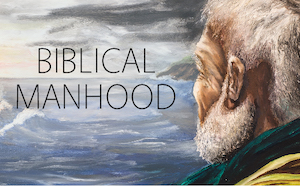
How can you reach an unconverted mind with the deeply spiritual lessons of the spring holy days?
The first two events in God’s master plan as depicted in the holy days—Passover and the Days of Unleavened Bread—deal with intense, sobering themes: the beating and death of Jesus Christ; the lethal wages of lawlessness; purging sin from our lives; seeking righteousness and perfection. Even with God’s Spirit, it takes focused, prayerful study and meditation to grasp these concepts as we should. We exert real effort to ensure we enter the Passover discerning the Lord’s body, with proper faith in the symbols of His flesh and His blood.
As you carry out your preparations—deleavening, cleaning, studying, reviewing, examining yourself and so on—be sure you devote attention to another of your responsibilities as a father: to prepare your children for the spring holy days.
God wants our children in on the action. A major proof of that is the multitude of physical activities He commands in association with these days. Every child is well aware that something special is going on as he experiences cleaning the leavening out of your home; the delightful Night to Be Much Observed; a whole week of different kinds of bread: special unleavened treats, or perhaps having to explain the Matzo sandwich to his friends at school; and so on.
God deliberately, purposefully planned the spring holy days to provide many unique and special teaching opportunities for your children.
He wants children personally involved in acting out the lessons embodied in these holy days, helping by deleavening their rooms, belongings and other parts of the house as they are responsible enough to do so. He knows how human minds work. We all need these traditions and activities each year to cement in our memories the awesome history they point back to, and the powerful symbolism pertaining to our spiritual lives today. But they are a particularly powerful way of capturing the attention of children.
We just have to do our part to take advantage of the opportunity they provide us.
Review Deuteronomy 6:6-7, which tell us to diligently teach our children God’s words—to talk about them when we sit in the house, when we walk by the way, when we lie down and rise up. These are always good to remember and apply.
Now notice just a few scriptures down. Verses 20-25 specifically mention the spring holy days and how, if we are involving our children in our preparations, we will naturally pique their curiosity and open the door to teach them.
“And when thy son asketh thee in time to come, saying, What mean the testimonies, and the statutes, and the judgments, which the Lord our God hath commanded you? Then thou shalt say unto thy son, We were Pharaoh’s bondmen in Egypt; and the Lord brought us out of Egypt with a mighty hand: And the Lord shewed signs and wonders, great and sore, upon Egypt, upon Pharaoh, and upon all his household, before our eyes: And he brought us out from thence, that he might bring us in, to give us the land which he sware unto our fathers. And the Lord commanded us to do all these statutes, to fear the Lord our God, for our good always, that he might preserve us alive, as it is at this day. And it shall be our righteousness, if we observe to do all these commandments before the Lord our God, as he hath commanded us.”
Break down these verses. Spend some time meditating on them and using them as the basis of your curriculum for family Bible study and discussion. They provide several specifics we can teach our children about the spring holy days: 1) We were enslaved, which is a wretched state to be in; 2) God freed us from that slavery, which was a wonderfully generous thing to do and for which we are eternally grateful and indebted to Him; 3) He destroyed Egypt and will likewise destroy Satan and everything else associated with sin; 4) He did all this by many miracles—miracles we can explain in detail; 5) He seeks in all this to give us the Promised Land—the Kingdom of God; 6) we are part of a rich history going all the way back to our forefathers in Israel; 7) we must obey God’s laws, commandments and statutes; 8) we must fear God; 9) God gave His laws for our good—they preserve our life; 10) following God’s laws carefully makes us righteous. And so on.
We can communicate these truths at whatever level our children can understand. We can explain them both in terms of ancient Israel and our own personal lives.
The history of Israel’s freedom from Egypt is packed with striking details that have spectacular spiritual meaning. The unblemished lamb that each family set aside and then killed and consumed (Exodus 12:3-6, 8-11; John 1:29). The use of the lamb’s blood as protection from the death angel (Exodus 12:7, 12-14; 1 Peter 1:19). The slaying of the firstborn (Exodus 12:29-30). The coming out of Egypt, a type of sin and the ways of Satan’s world (verses 31-38). The guidance of the pillar cloud (Exodus 13:20-22). The miracle at the Red Sea, a type of baptism (Exodus 14; 1 Corinthians 10:1-2). We can capture our children’s imaginations with these Hollywood-blockbuster-style details as a means of teaching them the spiritual relevance for New Testament Christians.
Exodus 13:7-8 also talk about the spring holy days and reinforce the importance of instructing our children in that context: “Unleavened bread shall be eaten seven days …. And thou shalt shew thy son in that day, saying, This is done because of that which the Lord did unto me when I came forth out of Egypt.”
God wants young minds to become acquainted with and begin to grasp these extraordinary spiritual concepts. We parents make all the difference in whether or not this happens.
Fathers, give special thought to trying to convey the deepest, most beautiful and perhaps most difficult concept of all: the love of God. Passover depicts the greatest act of love ever. How can you help your children identify with and appreciate the sacrifice of Jesus Christ and God the Father? This is a unique and noble challenge.
Your children’s understanding of God the Father comes largely through you, their physical father. A point you might consider in your spiritual self-examination is the degree to which your personal example reflects and conveys to them the nature of their Father in heaven—in terms of your love, your sacrifices for them, your patience, your judgment and mercy.
It is not easy, but the Passover does give you an opportunity to help them better understand God’s love, and turn their hearts more to their heavenly Father (Malachi 4:6).
Make these holy days a special time for your children. Include them in the deleavening and baking. Provide special activities or treats for the Night to Be Much Observed and the holy days. Most importantly, use all these physical tasks and details as tools to bring in the spiritual instruction. We can ensure that our children see our positive example and come to know why our great God has given us the wonderful blessing of the spring holy days.
